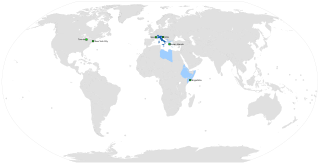
Giovanni Bononcini was an Italian Baroque composer, cellist, singer and teacher, one of a family of string players and composers.

The Accademia della Crusca, generally abbreviated as La Crusca, is a Florence-based society of scholars of Italian linguistics and philology. It is one of the most important research institutions of the Italian language, as well as the oldest linguistic academy in the world.

The Accademia di Belle Arti di Firenze is an instructional art academy in Florence, in Tuscany, in central Italy.
The Accademia degli Arcadi or Accademia dell'Arcadia, "Academy of Arcadia" or "Academy of the Arcadians", was an Italian literary academy founded in Rome in 1690. The full Italian official name was Pontificia Accademia degli Arcadi.

Alessandro Piccolomini was an Italian humanist, astronomer and philosopher from Siena, who promoted the popularization in the vernacular of Latin and Greek scientific and philosophical treatises. His early works include Il Dialogo della bella creanza delle donne, o Raffaella (1539) and the comedies Amor costante, and Alessandro, which were sponsored and produced by the Sienese Accademia degli Intronati, of which he was a member and an official. Much of his literary production consisted of translations from the Classics, of which Book XIII of Ovid's Metamorphoses and book VI of the Aeneid are early examples. In 1540, while a student at the University of Padua, he helped found the Infiammati Academy, in which he gave lectures in philosophy. His poetry, in which he followed the Petrarchan tradition, appeared first in various contemporary collections, and in 1549 he published as a single volume one hundred sonnets titled Cento sonetti. Later in life, he established in his sister-in-law's Villa of Poggiarello of Stigliano, near Siena, where he attended the revision of his previous essays, and where he wrote all his late works, as the translation of Aristotle's Poetics on which he wrote a learned commentary issued in 1575. His interest in Aristotle included the publication of a paraphrase of Aristotle's Rhetoric with commentary. In his Trattato della grandezza della terra e dell'acqua (1558), he opposed the Aristotelean and Ptolemaic opinion that water was more extensive than land.

Sperone Speroni degli Alvarotti (1500–1588) was an Italian Renaissance humanist, scholar and dramatist. He was one of the central members of Padua's literary academy Accademia degli Infiammati and wrote on both moral and literary matters.

Angelo Beolco, better known by the nickname Ruzzante or Ruzante, was an Italian (Paduan) actor and playwright. He is famous for his rustic comedies, written mostly in the Paduan variety of the Venetan language, featuring a peasant called "Ruzzante". Those plays paint a vivid picture of Paduan country life in the 16th century.
Canace is a verse tragedy by Italian playwright Sperone Speroni (1500-1588). It is based on the Greek legend of Canace, the daughter of Aeolus, who was forced by her father to commit suicide for having fallen in love with her brother, Macar.

The Accademia di Belle Arti di Bologna is a public tertiary academy of fine art in Bologna, in Emilia-Romagna in northern Italy. It has a campus in Cesena.

The Accademia di Belle Arti di Venezia is a public tertiary academy of art in Venice, Italy.

Cesare Pascarella, was an Italian dialect poet and a painter. He was appointed to the Royal Academy of Italy in 1930.
Francesco Portinaro was an Italian composer and humanist of the Renaissance, active both in northern Italy and in Rome. He was closely associated with the Ferrarese Este family, worked for several humanistic Renaissance academies, and was well known as a composer of madrigals and dialogues.
The Accademia degli Incamminati was one of the first art academies in Italy, founded in 1582 in Bologna.
The Accademia degli Intronati was a prominent literary and scholarly society in Siena. It was founded between 1525 and 1527 as a gathering place for aristocracy, and was prominent by the 1550s.
Marco Sgarbi is an Italian philosopher and an historian of philosophy, with a special interest in the history of epistemology and logic. He is associate professor at the Ca' Foscari University of Venice. He is member of the Accademia Nazionale Virgiliana.
The Accademia Fiorentina was a philosophical and literary academy established in Florence in the Republic of Florence during the Italian Renaissance. It was active from 1540 to 1783.
Accademia often refers to:

The Accademia degli Umoristi was a learned society of intellectuals, mainly noblemen, that significantly influenced the cultural life of 17th century Rome. It was briefly revived in the first half of the eighteenth century by Pope Clement XI.

Giovanni Francesco Loredan was a Venetian writer and politician, and a member of the noble family of Loredan. In 1630, he founded the Accademia degli Incogniti, a learned society of freethinking intellectuals, mainly noblemen, that significantly influenced the cultural and political life of mid-17th century Venice.
Eugenio Visdomini was an Italian poet and lawyer, active in Parma.










